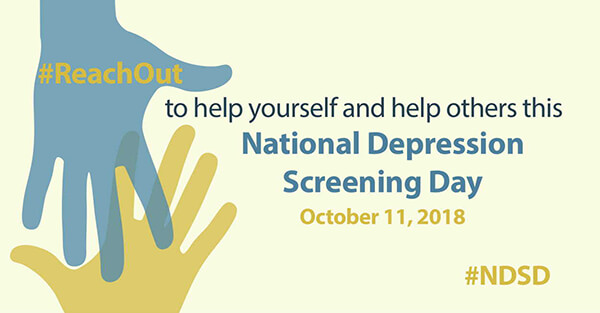
October 11th is National Depression Screening Day (NDSD). This day has been recognized on the Thursday of the first full week in October every year for over 25 years, and it’s dedicated to raising awareness and screening people for depression and other mood and anxiety disorders. The theme this year, Reach Out, focuses on connecting with those around you and finding support for yourself and others.
Depression screening is effective in linking at-risk individuals with treatment options. A 2009 independent research study conducted by the University of Connecticut and commissioned by Screening for Mental Health confirmed this connection. The study showed that 55 % of participants who completed an online depression screening and agreed to participate in a follow-up survey sought treatment within three months of the screening.
Every year, some 15 million Americans struggle with depression, an illness that comes in many forms- from major depression and seasonal affective disorder (SAD), to dysthymia and bipolar disorder. Severity of symptoms can range from mild to severe or situational to chronic, and vary over time. Depression affects individuals differently, so not everyone who is depressed experiences every symptom. Common symptoms include:
- Persistent sad or empty mood
- Feelings of hopelessness
- Loss of interest or pleasure in hobbies and activities that were once enjoyable
- Decreased energy and fatigue
- Changes in appetite leading to significant weight loss or weight gain
- Difficulty concentrating, remembering, or making decisions
- Insomnia, early morning wakening or oversleeping
- Restlessness, irritability
- Thoughts of death or suicide
- Persistent physical symptoms that do not respond to treatment, such as headaches, digestive disorders and chronic pain
The good news is depression is highly treatable, even in the most severe cases. The condition is often cyclical, and early treatment may prevent recurrent episodes. Many studies show that the most effective course of treatment is cognitive behavioral therapy (CBT), which addresses problematic thought patterns, sometimes combined with medication.
It’s important that we raise awareness and understanding about depression. If you or someone you know may be struggling with depression, EAP can be a great resource for support. We invite you to take a brief, confidential depression screen at our behavioral health website called The Living Well Network. You will get your score immediately after completing and submitting your responses, and you can print it out to share with a healthcare professional. You can also find screens for anxiety and risky drinking on the website.
Methodist Healthcare EAP is here to help if you would like to discuss concerns in your life. We offer free and confidential counseling to you and members of your household. Please call us today at (901) 683-5658 or toll free 1-800-880-5658 to schedule an appointment.
 Karole Shorter is a Licensed Clinical Social Worker and Certified Employee Assistance Professional with over 15 years of counseling experience. She received her Masters in Social Work from Florida State University in 1998. She has been a counselor at Methodist Healthcare EAP for ten years.
Karole Shorter is a Licensed Clinical Social Worker and Certified Employee Assistance Professional with over 15 years of counseling experience. She received her Masters in Social Work from Florida State University in 1998. She has been a counselor at Methodist Healthcare EAP for ten years.
